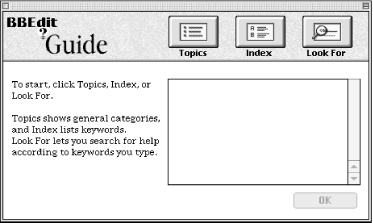Chapter 10. Apple Guide and Help Viewer
With Mac OS 8.5 and beyond,
Macintosh users have two pieces of system software to rely on for
getting help on the Mac OS and programs: the Apple Guide extension
and the new browser-based Help Viewer. Apple Guide (see Figure 10-1) is the tool that can be launched from the
Help menu command of several programs. It usually provides the most
basic software help, allowing the user to search a small help
database and spawning little animations that circle and choose menu
items for you. Mainly in response to the Web,
Apple's system has since moved to a browser-based
help system with the Help Viewer system application. Compared with
Apple Guide, Help Viewer more closely integrates the operating-system
help documents with web protocols and Sherlock 2. (Sherlock 2 is
covered in Chapter 17.) You can find the Help
Viewer in the following directory if you're running
Mac OS 8.5 or later: startup disk:System Folder:Help:Apple
Help Viewer:Help Viewer. This chapter describes the Apple
Guide's and Help Viewer's
dictionaries and gives some examples of how to script your own help
systems.

The scriptable Apple Guide extension is
located in startup disk:System
Folder:Extensions. You normally cannot open an
application's Apple Guide file from outside the app,
unless you are using trusty AppleScript. Example 10-1
opens up the BBEdit Guide file, goes instantly to the Look For help
panel, and places the search term
"grep" in that
panel's search edit field. An AppleScript can be
used as a software-testing device for new Mac help systems that use
Apple Guide.
Example 10-1. Opening the BBEdit Guide File
(* Apple Guide's 'open' command can take a file specification type for a
parameter *)
set filespec to¬
"macintosh hd:BBEdit 5.0:BBEdit 5.0:BBEdit Guide" as file specification
tell application "Apple Guide"
(* Use the 'string' labeled parameter and the 'ViewNumber' parameter
that takes an integer type *)
open database filespec string "grep" ViewNumber 4
end tell
|



